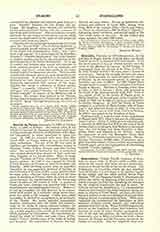

Guarino da Verona, humanist, b. 1370, at Verona, Italy; d. 1460, at Ferrara. He studied Latin in the school of Giovanni da Ravenna, and afterwards went to Constantinople, where he studied Greek under Manuel Chrysoloras, in whose household he spent five years. In 1408 he returned with more than fifty Greek MSS. to Venice, where he was received with great enthusiasm. The rest of his life was spent in teaching and lecturing with extraordinary success in Florence, Venice, Verona, Ferrara, and other Italian cities. His method of instruction was so celebrated that students flocked from all parts of Italy, and even from England, to his lecture-room. Many of them, notably Vittorino da Feltre, afterwards became well-known scholars. In 1429 he was engaged by Niccolo d’Este, Marquess of Ferrara, as tutor to his eldest son Lionello. After devoting several years to Lionello’s education, he was appointed professor of rhetoric in the University of Ferrara (1436), a post which he held for many years. The last thirty years of his life were spent in teaching at Ferrara, where he acted as interpreter between the representatives of the Greek and Latin Churches at the council of 1438. A master of Greek and Latin, Guarino was endowed with a wonderful memory and indefatigable industry. Moreover, he led an exemplary life and deserves to be remembered with respect as a humanist whose moral character was equal to his learning. Unlike some other humanists, he showed no antagonism to the authority of the Church. His works included grammatical treatises, translations from the Greek, and commentaries on the works of various classical authors. In addition to an elementary Latin grammar, he brought out a widely popular Latin version of the catechism of Greek grammar by Chrysoloras. His translations included the whole of Strabo and some fifteen of Plutarch’s “Lives”, besides some of the works of Lucian and Isocrates. He commented on Persil’s, Juvenal, Martial, and some others. He was an industrious discoverer and collector of Latin MSS., among them being MSS. of the younger Pliny, Cicero, and Celsus. At Venice he discovered a MS. of Pliny’s “Epistles” containing about 124 letters, and several copies of this were made before it was lost. He left behind him many speeches and some 600 letters.
EDMUND BURKE

